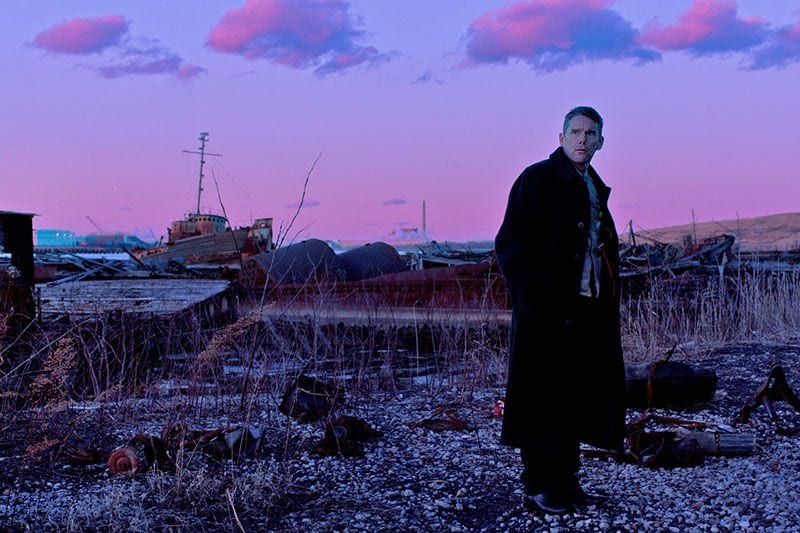
In 1972, Paul Schrader published Transcendental Style in Film, his study of Yosujiro Ozu, Robert Bresson, and Carl Dreyer. It was pretty much the kind of book that you would expect from Schrader, raised as a Calvinist before kneeling at the altar of cinephilia. In the book, he defines art and religion as the two great transcendent human experiences. For all that, Schrader made his name not by strictly following the steady and patient worlds of those three masters. Instead, he pursued a brand of vengeance cinema (Taxi Driver, Hardcore, even Raging Bull to some degree) that hewed closer to the strict and punishing moralism of his Calvinist roots. Somehow, it took him over 40 years after that book to finally get around to paying homage to Bresson. It was worth the wait.
In First Reformed, an Ethan Hawke at his most pained plays the Reverend Toller. Minister for a tiny museum of a church in upstate New York that’s about to celebrate its 250th anniversary, he’s at the tail-end of a years-long spiritual crisis. By the time the movie catches up to this nearly cadaverous penitent, Toller has already lost his son to the Iraq War, his wife to divorce not long after that. He writes in a journal each night, bottle of whiskey at his side. Scripture brings him no solace, and the kids at the youth group he oversees are more interested in slick WWJD-type bromides or culture-war pronouncements than Christ-like humility. He’s haunted by doubt that’s as painful as the cancer that might be growing in his gut. If there was ever any great joy or purpose to his pastoral work, it has long departed. He’s a refracted image of the sickly and put-upon Claude Laydu in Bresson’s punishing Diary of a Country Priest (1948), whose high-minded faith is tested by the profane realities of the mocking parishioners and his failing body.
But then Toller is approached by Mary (a simmering Amanda Seyfried). She asks Toller to come see her husband, Michael (Philip Ettinger). He’s been worrying himself sick over climate change, telling the pregnant Mary that it would be immoral to birth a child only to bequeath them a life likely to be filled with horror and catastrophe. On the outside Toller, in his long black cassock and with the lean look of a wounded bird of prey, would seemingly be the wrong person to bring Michael back to any kind of hopeful equilibrium. But, despondent over the minuscule attendance at his services and not enamored of the nearby corporate-looking megachurch run by his same denomination, Toller relishes the challenge. This is a minister who keeps Thomas Merton at his bedside table, not Joel Osteen. To him, the debates with Michael—which only take up a few minutes but are the spark that powers the movie—are like Jacob wrestling the angel. “It was exhilarating,” he thinks with unabashed honesty.
Ethan Hawke, Amanda Seyfried (IMDB)
In Michael, Toller finds not just a mission that he can dig into, but a kindred spirit whose gloom matches his own long dark night of questioning. He also appreciates the strident nature of Michael’s despair, which is bending toward a kind of suicidal eco-terrorism that resonates with a suffering penitent like Toller who might be looking for a martyr’s way out. Schrader is no stranger to self-inflicted pain; most of his characters seem to relish it. There’s not a lot of space between Toller’s embrace of an apocalyptic narrative and Jake La Motta’s need to put his face and body in front of every punch.
Schrader doesn’t unquestioningly endorse Toller’s point of view, though the movie is certainly sympathetic. The closest thing First Reformed has to a villain is the late-appearing Ed Balq (Michael Gaston), a businessman with a Koch brothers attitude toward the environment whom Toller makes nice with since he’s bankrolling the church’s anniversary celebration. But Toller’s superior at the megachurch, Reverend Jeffers (Cedric Kyles, dropping “the Entertainer” for a rare dramatic role) doesn’t have any patience for what he sees as narcissistic nonsense. He frustratedly lectures Toller, careening toward his own fateful reckoning, about how “even Jesus” wasn’t always suffering in the Garden of Gethsemane.
Although Schrader pays homage to Bresson throughout this sharp, bleak, and oddly oblique metaphor of a movie, there’s a lot in First Reformed that would feel foreign to Bresson. He likely wouldn’t have included that gag about the hymn that Martin Luther wrote while in the outhouse (ministerial humor), for instance. But First Reformed does share with Diary of a Country Priest an understanding of how even despair can be transcendent; until it’s not.


